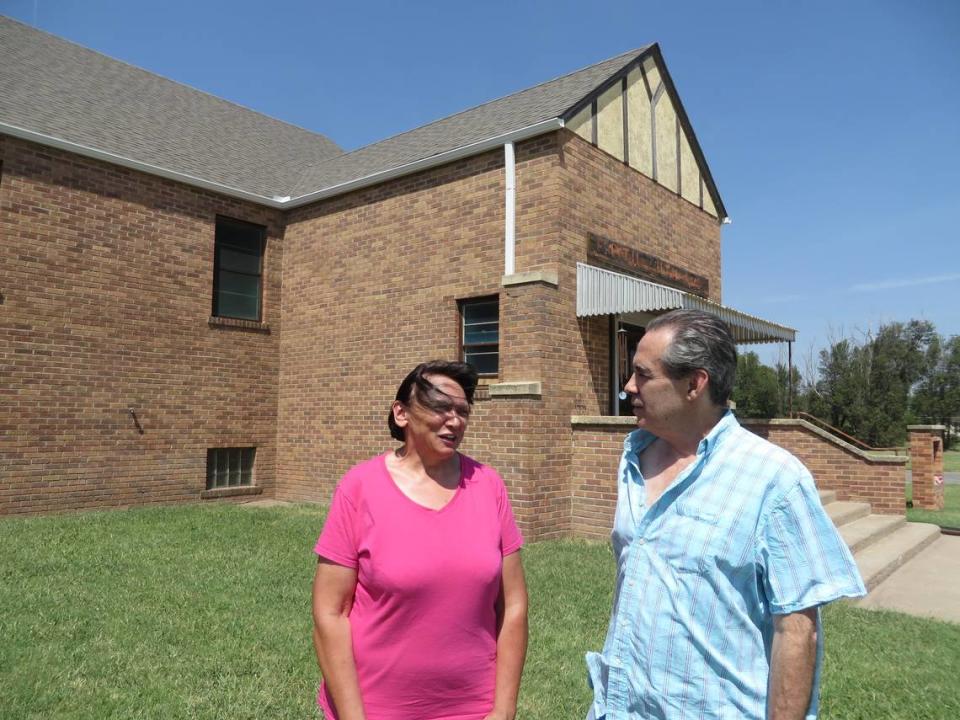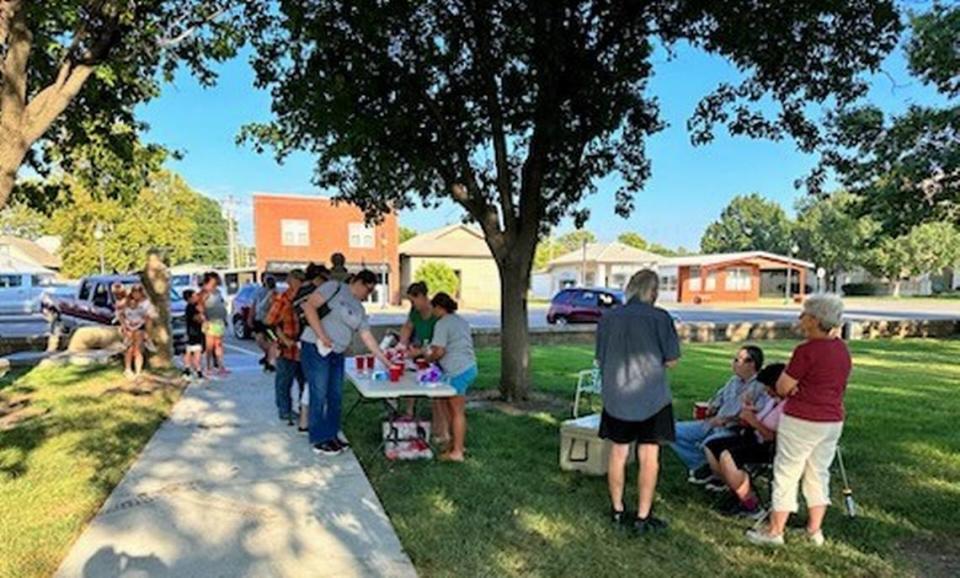Couple’s fight to live in rural Kansas church enters ninth month. When will it end? | Opinion
If Mike Rosseau and Dorothy Tobe were a little younger, they could have had a baby in the time they’ve spent trying to move into St. John.
It’s been nine months since the married couple bought an abandoned church building they hoped would be their forever home on the range, only to get entangled in a Kafkaesque bureaucratic nightmare — and even criminal charges — brought on by hostile neighbors led by a prominent local businessman and former city councilman.
Rosseau and Tobe’s story is a cautionary tale of small-town political favoritism at its worst.
And it’s also an inspiring story of ordinary small-town citizens rallying against injustice when they see it.
Since July, the couple has been working on converting their church into a residence by day, and sleeping nights in their Realtor’s guest room in Hudson, 12 miles away.
Now it’s crunch time, and it’s time for St. John City Hall to finally do the right thing and let Rosseau and Tobe occupy their home.
For months, they’ve worked to bring the former church up to code as livable space.
They’ve removed most of the old pews, added a bathtub, fixed broken windows, installed an electric range in the kitchen, upgraded plumbing and electrical systems and sorted out the basement, which had been filled with their belongings and miscellaneous junk left behind by the previous owners.
As homes go, it’s an unusual layout. They have three beds, one upstairs where the church altar used to be and two in the basement. The kitchen is also in the basement, which used to be the church’s fellowship hall.
On Nov. 28, city building inspector Curtis Smith found no violations and made only minor suggestions in his report.
“He said it was better than a lot of the buildings he’s seen in town,” Rosseau said.
Pushed out and pushed around
Tobe and Rosseau could be the poster children for the crisis of housing affordability across America.
Both in their 60s, they had lived a quiet, happy and unassuming life for 30 years in a house they called the “Shabby Shack,” next to a gas station in Denver. He was a bicycle mechanic and she supplemented their income with a small-scale business selling antiques and tchotchkes on eBay.
Rosseau suffered a heart attack in July of 2022. A day later, while he was still hospitalized, Tobe was notified by their landlord that he’d be selling the Shabby Shack to a developer, who’d also bought up the gas station and several other properties to build luxury apartments to serve Denver’s overheated housing market. It’s hard to blame him. He got $825,000 for the modest home, which Rosseau and Toby were renting for $675 a month.
They couldn’t find anything they could afford in Denver or elsewhere in Colorado, so they expanded their search to Kansas. They inquired about some Topeka fixer-uppers, but were overbid by house flippers.
Their ongoing web search turned up the abandoned church in St. John, which appeared to be a creative solution to an otherwise unsolvable problem.
Built in 1940 as a Church of Christ and later serving a Lutheran congregation, the church was eventually deconsecrated and sold. When the couple bought it, it had been vacant at least 20 years and was being used by a local family as a storage unit.
They paid $43,000, moved their stuff in and planned to rough it for a while while they fixed up the place, which people have done practically since the invention of housing.
County records and real estate ads listed it as residential, but it turned out to be just inside the northern edge of St. John’s downtown commercial zone, which meant they would need special permission from City Hall to live there.
They applied, but the City Council voted them down after getting a complaint letter from former council member Kevin Davis, president of Davis Electrical, a contracting business at the other end of the block from the church. The letter was also signed by Jeni Jones, who owns a beauty salon next door to Davis’ business.
Then the absurdity turned to cruelty.
Rosseau and Tobe got the seminal honor of being the only people ever to be charged with a criminal violation of the St. John zoning code, for the handful of days they spent overnight in the church when they first got to town.
According to the charging document, the penalty was a $500 fine and/or six months in jail for each day they occupied the property.

Confusion and delay
On Jan. 10, Rosseau and Tobe applied to have their property rezoned as residential.
The Zoning Board rejected the request on a 2-2 tie in a meeting two weeks ago. It’s a five-member board, but Jones, who co-signed the original complaint letter, abstained due to conflict of interest.
The vote came after city clerk/zoning administrator Pam Watson informed the board that the town’s mayor, Bobby Stimatze, owns a property that he believed to be commercial-zoned just north of the Rosseau-Tobe property.
The mayor’s land is a vacant lot. There used to be a hotel there, but it was torn down sometime in the 1980s, before the city had zoning.
It delayed and confused things, because if the mayor’s lot was commercial, Rosseau’s and Tobe’s church would be surrounded on all four sides by commercial property. That would have made their request a case of “spot zoning,” which is more complicated than simply redrawing the boundary of the commercial zone around them.
As it turned out, the mayor’s lot is residential and has been since the zoning code was approved in 2011.
When the issue came back to the Zoning Board in an appeal last week, the members — including the police officer who served Rosseau and Tobe with the city’s criminal complaint — reversed the vote from a week earlier and recommended a special-use permit instead of a zone change for their property.
Confused? You’re not alone.
That’s exactly what Rosseau and Tobe applied for last July and what was rejected after the complaint from Davis and Jones.
It’s progress, but slow. If there are no more hiccups, it will still be more than a month until Rosseau and Tobe can move in.
They had to re-apply for a special-use permit; the public hearing’s scheduled for March 26.
If it’s approved by the Zoning Board, which doubles as the city’s Planning Commission, opponents get 14 days to raise a protest petition before it goes to the City Council for final approval.
If owners of 20% of the land within 200 feet of the church object, then Tobe and Rosseau would need four of the five council members to get their permit approved.
The vote the first time around was 4-1 against them.
Citizens rally around couple
Since their rejection by the council, the political climate has changed and lot of people in St. John think Rosseau and Tobe have gotten a raw deal from City Hall.
A GoFundMe for the couple raised $3,300. As organizer Mike Hathaway put it: “They inadvertently got caught up in a web of small town drama and pettiness.”
An anonymous donor gave them $500 for lawyer fees.

When I first wrote about this case in September, at the end of my column, I noted that three City Council members who voted against Rosseau and Tobe’s special-use permit were running unopposed for re-election in November. My last line was “situations like this are what write-in campaigns were invented for.”
I don’t know that I can claim any credit, but it actually happened.
On Nov. 7, write-in candidate Aaron Raines got the second-highest vote total in the election and displaced now-former council member Ryan Christie, Kevin Davis’ employee and business partner.
And Sandy Smith, the 79-year-old director of the town’s senior center, tore into the Zoning Board at last week’s meeting: “For those who don’t want it to happen, the rezoning, explain why — a good, logical, respectful reason why,” she asked.
Board member and former mayor Jill Stimatze (who’s only distantly related to the current mayor, if at all), replied on the board’s behalf:
Because that whole block, that would be the only thing on there that is residential … So if we would happen to go ahead and accept that and rezone that, guess what? It’s going to open up a whole brand new book. Any other place in this community can come and say “Hey, will you rezone this for me?’ And I don’t want to go there. That’s why we sat here for hours and hours and hours when we did the zoning book. In 2011, Kevin Davis was on the council. I was mayor of St. John and we went over and spent hours and days doing this. I think it was done very well. So, that whole block over there is commercial.
Smith wasn’t buying it:
Jill, you may have that reason, but I personally feel some of it’s personal. . . . And I think it’s very unfair for this couple, who has worked their hearts out this year to make a place that you all would have let rot down and taken to tax (sale). No. they’re making something good. I think it’s really un-Christian, unthinkable that you would even consider not doing it. I love our town, I love our people. We are not split on this issue. There might be five or six people that would vote ‘No.’ The rest of the town, I think we’re pretty much in agreement that it’s a really sh---y thing you’re all doing, and you can quote me.
Chad Fisher, the president of the St. John-based SJN Bank, was also at the meeting. A week earlier, he publicly offered to buy the church so Rosseau and Tobe could move to a more conventional single-family home.
Last week, they told him no thanks, because they’ve spent months of hard work remodeling their church and aren’t up to taking on another fixer-upper project. “The struggle to be here has exhausted us both,” Tobe said. “We’re not interested in moving again.”
The cheapest turnkey home in St. John would cost twice what they paid for the church. There’s only one home on the market for under $100,000, a $50,000 house that was abandoned by its previous owner.

Selective enforcement
Also at the Zoning Board meeting was Kevin Davis, who “no commented” me before I could ask him a single question.
It’s a pity, because I wanted to ask him about two things:
1) What does he care whether people live in a church a block away from his business, unless he has his own designs on their property?
and
2) I wanted to discuss his own compliance with the zoning code at Davis Electrical.
I looked up the city regulations and in the downtown zone they allow: “Establishments employing not more than five persons in construction businesses such as plumbing, heating, air conditioning and electrical work.”
I also looked up Davis’ application to the U.S. Small Business Administration for Paycheck Protection Program funding during the COVID-19 pandemic. His filing said he had seven employees. That’s 40% more than he’s allowed to have in the zone where his business is situated.
Watson confirmed that having seven employees at a contracting business downtown would be a violation, but said the city doesn’t have a code enforcement officer to look into it — along with myriad other zoning violations around town like numerous cars parked on grass, which is one of the main complaints against Tobe and Rosseau.
So apparently, when a prominent local business person like Kevin Davis complains about other people’s zoning issues, it’s an immediate action item for the city government, complete with criminal charges and month after month of who-knows-how-much staff time spent on bureaucratic process.
But then when evidence surfaces that the same prominent local businessman may have violated the same zoning code — which by the way he helped write when he was a City Council member — local government somehow can’t spare the resources to investigate.
Maybe it’s just a coincidence that “Good Ol Boys,” the theme song from the TV show “Dukes of Hazzard,” is playing in my head right now. Or maybe it’s not a coincidence.
Prove me wrong, St. John.
Kansas couple criminally charged for sleeping in church | Opinion

